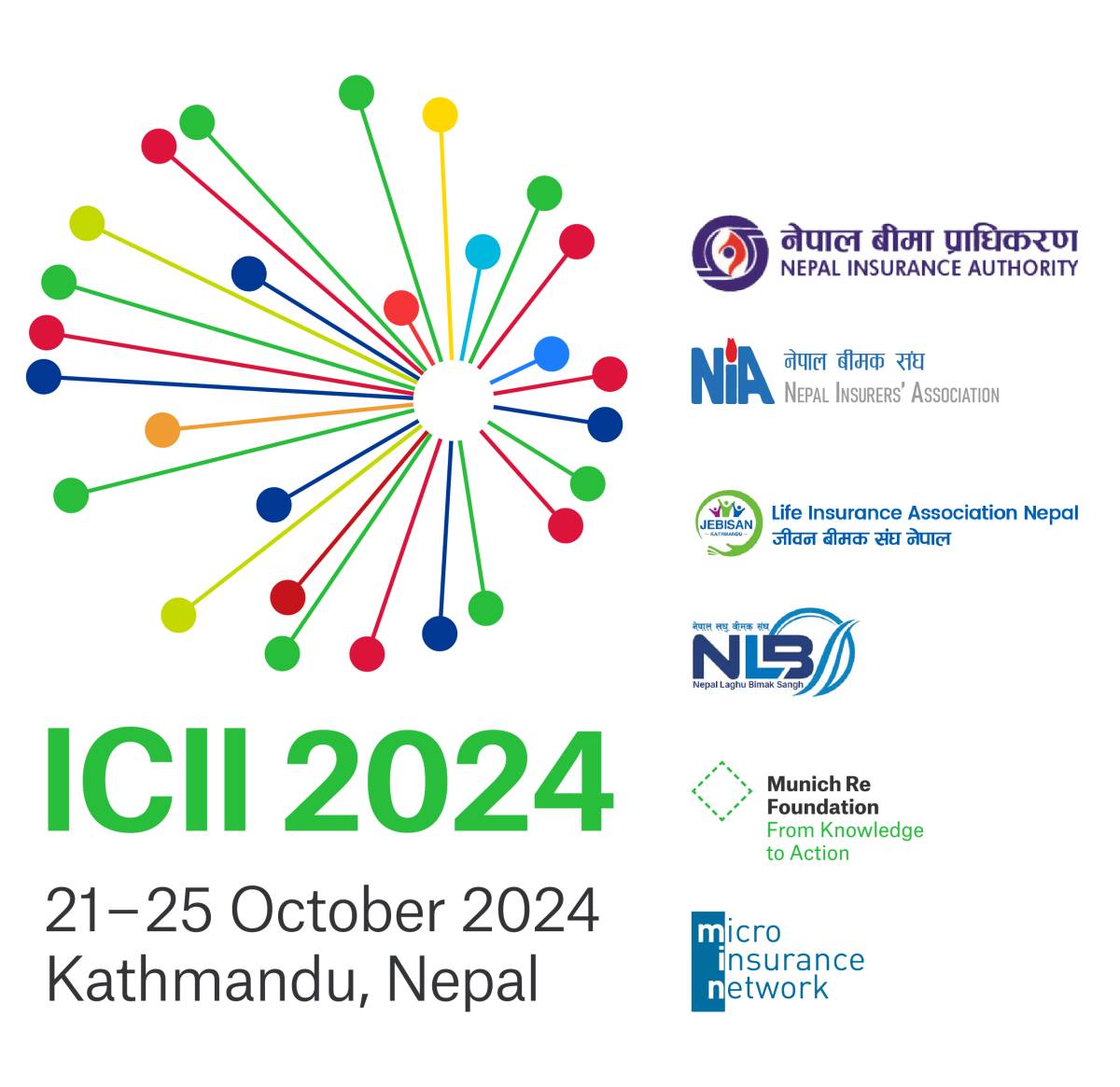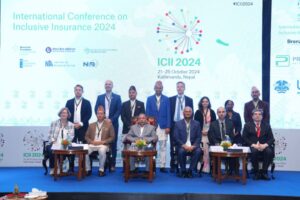The 20th edition of the International Conference on Inclusive Insurance (ICII) concluded on a high note in Kathmandu, Nepal, after five days of insightful discussions, interactive workshops, and collaborative networking. Hosted by the Nepal Insurers’ Association in partnership with the Life Insurance Association Nepal, Nepal Micro Insurance Association, Nepal Insurance Authority, Munich Re Foundation, and the Microinsurance Network, the conference brought together around 500 participants from around the globe. The Insurance Times was the media partner in the event.
Key Themes and Focus Areas
Themed “Innovation and Collaboration in Inclusive Insurance: Addressing Climate Risk, Leveraging Digital Solutions, and Breaking Barriers,” ICII 2024 centered on advancing insurance solutions for underserved and vulnerable communities, especially in the face of growing climate challenges. This year’s agenda featured 24 sessions, covering various aspects of inclusive insurance, from climate risk and resilience to digital innovation and public-private partnerships.
The conference emphasized three main areas:
1. Climate Risk Insurance: Sessions highlighted how climate risk insurance could protect low-income populations from natural disasters. Experts shared insights on scalable insurance models that offer resilience against climate-induced losses, underscoring the importance of accessible and affordable insurance in climate-vulnerable regions.
2. Digital Innovations in Microinsurance: Digital technology was a major focus, with discussions on how mobile technology, big data, and AI are transforming microinsurance. Participants explored case studies on how these digital advancements make insurance more accessible and affordable for underserved communities.
3. Overcoming Barriers to Scaling Inclusive Insurance: The conference addressed barriers like regulatory challenges, distribution hurdles, and consumer awareness. Discussions shed light on effective strategies for overcoming these obstacles and making inclusive insurance solutions both practical and impactful.
ICII 2024 concluded with a call to action, encouraging insurers, regulators, and development partners to work together toward building a sustainable inclusive insurance ecosystem.
The conference’s success underscored the importance of innovation and collaboration in building a resilient, inclusive insurance industry capable of addressing the diverse risks faced by vulnerable populations.
As ICII 2024 drew to a close, participants departed with fresh insights, strengthened partnerships, and a renewed commitment to advancing inclusive insurance for the betterment of communities worldwide. The conference highlighted Nepal’s role as a valuable host, demonstrating the tangible impacts of inclusive insurance in action, with valuable lessons that resonate far beyond its borders.
Key Statements from Speakers
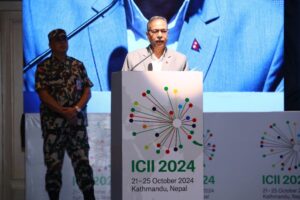
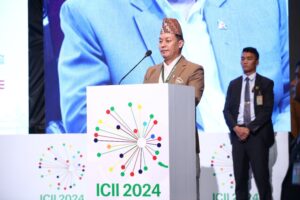
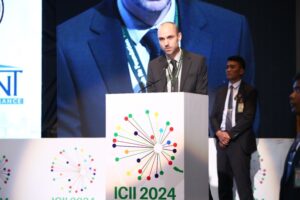
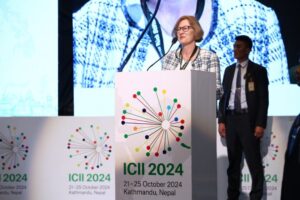
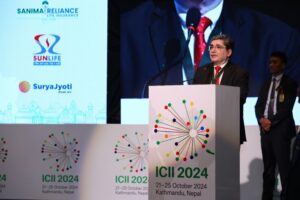


Report – Pre Conference Workshop on Day 1 – ICII 2024
Highlights of Sessions
Workshop 1: Introduction to Inclusive Insurance
Hosted by: International Labour Organization (ILO)
Speakers:
- Craig Churchill, Chief, ILO, Social Finance, Switzerland
- Lisa Morgan, Technical Specialist, Actuary, ILO’s Impact Insurance Facility, Switzerland
- Pranav Prashad, Senior Technical Officer – Impact Insurance Facility, ILO, Switzerland
- Ali Tareque Parvez, Inclusive Insurance Collaborator – Asia, ILO, Cambodia
- Purvi Bhavsar, CEO, Pahal Finance, India
The opening workshop aimed to provide a comprehensive introduction to inclusive insurance for new entrants to the field and those attending ICII for the first time. Led by experts from the ILO, the session highlighted the central challenges and opportunities within inclusive insurance, particularly in reaching underserved communities with affordable insurance solutions.
Excerpts: There are three key factors in developing inclusive insurance products: creating valuable offerings, building partnerships, and designing customer journeys tailored to different market segments. Products should aim to serve underserved groups such as women, small holder farmers, and MSMEs, each with their own specific needs and preferences.
Effective distribution channels are crucial for ensuring that inclusive insurance products reach end users. These channels should be accessible, particularly in remote areas, and must focus on the entire customer journey, from initial contact to claims settlement.
Additionally, adopting a customer-centric approach to create a seamless customer journey is vital in micro insurance. This requires clear communication, education, and an efficient claims process to build trust and loyalty among customers.
Key Points Covered:
- Defining Inclusive Insurance: Craig Churchill emphasized the importance of inclusive insurance in providing financial security to low-income populations vulnerable to financial shocks.
- Opportunities for Growth: Lisa Morgan presented recent trends showing increased demand and potential growth in the inclusive insurance sector, with a focus on markets in Asia and Africa.
- Challenges in Implementation: The speakers outlined operational challenges, including low awareness, regulatory limitations, and infrastructure issues that restrict insurance reach.
- Interactive Networking Session: An interactive segment allowed participants to engage with the speakers and peers, fostering connections and promoting collaboration among attendees. This networking session was particularly beneficial for those new to inclusive insurance, helping build a supportive community.
The workshop set a strong foundation for the rest of the conference by familiarizing participants with the fundamental issues in inclusive insurance and encouraging a collaborative approach to overcoming these challenges.
Workshop 2: Pricing Health and Life Insurance Products – A Practical Tool
Hosted by: Milliman and United Nations Development Programme (UNDP)
Speakers:
- Josh Collins, Consulting Actuary, Milliman, USA
- Brian Merkey, Manager, Data Science, Milliman, USA
- Romain de Harlez, Consulting Actuary, Milliman, Belgium
- Amir Hassan, Actuarial Associate, Milliman, Malaysia
Facilitator: Enock Sing’oei, Agricultural Insurance Specialist, UNDP – Insurance & Risk Finance Facility (IRFF), Kenya
This workshop focused on practical tools for pricing life and health insurance products targeted at low-income populations. The session introduced the Global Actuarial Initiative (GAIN) toolkit, a collaborative project between Milliman and the UNDP designed to develop actuarial expertise in emerging markets.
Excerpts: The crucial role of actuaries was highlighted, as their expertise ensures that products remain accessible to low-income populations while managing the insurer’s risk. However, they face several challenges, including limited or unreliable data, volatile economic conditions, an unsuitable regulatory environment, educational and cultural barriers, and the difficulty of balancing affordability with sustainability.
During the session, the SUAVE model (Simple, Understood, Accessible, Valuable, Efficient) was introduced as a guiding framework for developing microinsurance pricing models. Finally, we explored the steps involved in pricing life insurance and hospital cash health insurance products.
Highlights of the Workshop:
- Introduction to the Pricing Toolkit: Josh Collins and Brian Merkey demonstrated the functionalities of the GAIN pricing toolkit, which includes models for hospital-cash health products and life insurance.
- Actuarial Principles in Microinsurance: Romain de Harlez elaborated on how actuarial principles can ensure sustainable pricing for microinsurance products, addressing the high-risk profiles of low-income populations.
- Toolkit Applications: Amir Hassan provided a step-by-step walkthrough of how to apply the toolkit in different market conditions, stressing the importance of contextual adjustments based on local health and income data.
- Audience Interaction and Q&A: The workshop facilitated a Q&A session where participants discussed the challenges of pricing in underserved markets, and explored how the toolkit could support their organizations in developing affordable insurance offerings.
Attendees left with a comprehensive understanding of the toolkit’s applications, equipping them with practical tools to support sustainable and inclusive insurance pricing.
Workshop 3: Landscape of Climate Risk Insurance Solutions for MSMEs in V20 Countries
Hosted by: United Nations Environment Programme (UNEP)
Speakers:
- Manoj Pandey, APAC Coordinator, UNEP FI-V20 Sustainable Insurance Facility, Switzerland
- Rafkat Kabir, Lead, Strategy & Implementation (MSME) – Microfinance, BRAC, Bangladesh
- Yannick Milev, CEO, Chameroun MFI, Cambodia
- Uthpala Thilini Gunawardana, Deputy Manager Sustainability Unit, Regional Development Bank, Sri Lanka
- Ny Lyhoung, Business Unit Head/CEO, Micro & Agriculture Insurance, Forte, Cambodia
Facilitator: Brandon Mathews, Global Coordinator, UNEP FI-V20 Sustainable Insurance Facility, Switzerland
This workshop offered insights into the landscape of climate risk insurance solutions for Micro, Small, and Medium Enterprises (MSMEs) in V20 countries, which are highly vulnerable to climate change.
Key Topics Discussed:
- Climate-Smart Insurance: Manoj Pandey presented the UNEP FI-V20 Sustainable Insurance Facility’s approach to climate risk, emphasizing the role of climate-smart insurance in building resilience among MSMEs.
- Insights from V20 Countries: Rafkat Kabir and Yannick Milev shared experiences from Bangladesh and Cambodia, highlighting how climate-resilient credit portfolios have protected MSMEs from financial losses due to climate events.
- Practical Applications for MSMEs: Uthpala Thilini Gunawardana provided case studies from Sri Lanka, where regional banks integrate climate risk insurance to secure the financial stability of MSMEs.
- Collaborative Implementation: Brandon Mathews facilitated discussions on the importance of collaboration between insurers, governments, and MSMEs to scale these solutions effectively.
This session showcased actionable strategies for integrating climate risk insurance into MSME financing, providing attendees with models that can be adapted to their own markets.
Workshop 4: 19th A2ii Consultative Forum – Enhancing Data-Driven Insurance Supervision
Hosted by: Access to Insurance Initiative (A2ii) and International Association of Insurance Supervisors (IAIS)
The 19th A2ii Consultative Forum brought together international experts to explore the role of data-driven insurance supervision. The forum was structured into three sessions:
Session 1: Foundations of Data-Driven Supervision
Speakers:
- Gabriel Porto, General Coordinator of Economic Studies, SUSEP, Brazil
- Barbara Chesire, Managing Director, AB Entheos Ltd., Kenya
Facilitator: Matthias Range, Executive Director, A2ii, Germany
This session introduced the basic principles of data-driven supervision, emphasizing consumer protection. Speakers discussed the benefits and challenges of using data analytics in regulatory frameworks, highlighting the need for ethical practices in data collection and usage.
Session 2: Advanced Analytics and Practical Applications
Speakers:
- Alastair Norris, Climate and Disaster Risk Expert, IDF Risk Modelling Steering Group (RMSG), United Kingdom
- Min Hung Cheng, Deputy CEO, Global Asia Insurance Partnership, Singapore
- Moustafa Khalil, Deputy Assistant of the Chairman, FRA, Egypt
Facilitator: Ronaldo Limbago, Regional Coordinator for Asia, A2ii, Philippines
This session focused on advanced analytics, with speakers discussing how data-driven regulatory frameworks can enhance risk assessment and compliance. Alastair Norris and Min Hung Cheng shared insights into using data for disaster risk management and predictive modeling in insurance supervision.
Session 3: Collaboration and Future Technologies
Speakers:
- Anuja Jaitly, Global Business Development, Blue Marble, USA
- Kay Tuschen, Head of Climate Resilience Solutions, CelsiusPro, Switzerland
- Gabriel Porto, SUSEP, Brazil
Facilitator: Pedro Pinheiro, Project Manager, Microinsurance Network, Luxembourg
In this concluding session, speakers highlighted the role of collaboration and emerging technologies in transforming insurance supervision. Future technologies such as AI, blockchain, and advanced data platforms were discussed, providing insights into their potential for more responsive and inclusive insurance regulation.
The A2ii forum concluded with a call for collaborative action and technological adaptation to create a more effective and ethical regulatory environment.
Report Day 2 – ICII 2024
On October 22, 2024, the International Conference on Inclusive Insurance (ICII) entered its second day, featuring a series of plenary sessions and a press conference that addressed critical aspects of inclusive insurance.
Plenary 1: Opening of the ICII 2024
The inaugural session of ICII 2024 opened with keynote addresses and welcome remarks from distinguished guests and dignitaries. The session emphasized the importance of inclusive insurance in addressing global socio-economic challenges, with a special focus on emerging markets and underserved communities.
- Guest of Honor: Ramsahay Prasad Yadav, Hon’ble Vice President of Nepal
Vice President Yadav underscored Nepal’s commitment to inclusive insurance, highlighting the importance of risk protection in a country prone to natural disasters. His speech emphasized that inclusive insurance solutions could uplift vulnerable populations and enhance national resilience.
Keynotes:
- Arup K. Chatterjee, Principal Financial Sector Specialist, Asian Development Bank, Philippines
- Jeffrey D. Sachs, Director of the Center for Sustainable Development at Columbia University and President of the UN Sustainable Development Solutions Network, USA (via video message)
Arup discussed the critical role of regulatory frameworks and innovative financing solutions in advancing inclusive insurance. Jeffrey Sachs, through a video message, connected inclusive insurance to the United Nations Sustainable Development Goals (SDGs), emphasizing the need for cross-sector collaboration to ensure financial security for low-income populations worldwide.
Welcome Notes:
- Renate Bleich, Chair, Munich Re Foundation, Germany
- Matthew Genazzini, Executive Director, Microinsurance Network, Luxembourg
- Chunky Chhetry, CEO, Sagarmatha Lumbini Insurance / President, Nepal Insurers’ Association, Nepal
- Surya Prasad Silwal, Chairman, Nepal Insurance Authority, Nepal
The welcome speakers expressed their commitment to advancing the inclusive insurance agenda. Chunky Chhetry and Surya Prasad Silwal highlighted Nepal’s progress and the country’s potential to serve as a model for inclusive insurance in Asia.
This opening session set a collaborative tone for ICII 2024, aligning stakeholders on the conference’s mission to bridge the protection gap through inclusive insurance solutions.
Mr Arup Chatterjee in his keynote address remarked “Insurance has the power to transform. Use it well, and we can indeed create insurance for all”. Insurance and innovation can protect livelihoods and foster resilience against natural catastrophes and climate change. Insurance also eases fiscal burdens as counter cyclical mechanism, better preparing governments for shocks. Governments can better prepare for economic fluctuations by implementing countercyclical mechanisms including insurance. Insurance can ease the financial burden of governments in crisis. Asia suffers from a wide insurance and pensions protection gap which is also a pressing global issue.”
Plenary 2: The Landscape of Microinsurance – Bridging Gaps, Building Futures
Hosted by: Microinsurance Network
Speakers:
- Nicolas Morales, Regional Manager for Latin America and the Caribbean, Microinsurance Network, Colombia
- Laura Rosado, Head of Strategy and Performance Management, AXA EssentiALL, France
- Solene Favre, Global Insurance Director, VisionFund International, France
- Rachel Levenson, Chief Commercial Officer, Turaco, Kenya
- Erik Jarrin, Latin America and Reinsurance Lead, Microinsurance Master, USA
- Diana Almoro, Regional Lead Asia Pacific, UNDP-IRFF, Thailand
Facilitator: Matthew Genazzini, Executive Director, Microinsurance Network, Luxembourg
Excerpts: Nicolas Morales
engaged the audience by gathering their perspectives on microinsurance myths. He also showcased the impressive growth of the Landscape study, which now includes 294 insurance providers, 985 products, and covers 37 countries in the latest 2023 report.
The panel, moderated by Matthew Genazzini, featured insights from Erik Jarrin Peters Rachel, Levenson, Solène Podevin Favre, and Laura Elena Rosado who tackled key myths:
Myth 1: Limited Business Opportunities and Scalability
Matthew Genazzini highlighted the industry’s expansion in Asia, Africa, and LATAM, with more product lines and partnerships showcasing microinsurance’s scalability. The Landscape study showed that microinsurance products often take 3-4 years to gain traction, dispelling the notion that opportunities are limited.
Myth 2: Lack of Information for Growth
Solène Podevin Favre emphasised the growing availability of data, especially gender-specific metrics, which are enhancing product targeting. Although many products lack gender-disaggregated data, the study found that female policyholders can make up to 70% of customers in some NGO-led channels. This proves that sufficient information exists to drive growth, particularly for underserved populations like women.
Myth 3: Microinsurance Can’t Drive Financial Inclusion
Rachel Levenson explained how microinsurance is driving inclusion by leveraging diverse payment methods. The 2024 study found that while traditional channels like financial institutions still dominate, emerging digital platforms—like mobile wallets and insurtechs—are making significant strides. This evolution is advancing financial inclusion, particularly in Africa, via mobile money and digital payment systems.
Myth 4: Regulatory Constraints
Laura Elena Rosado discussed how the regulatory landscape is evolving, with more countries adopting supportive frameworks for microinsurance. The study underscored the critical role of regulation, with public-private partnerships fostering growth. Laura noted that regulators are becoming strategic allies, enabling innovation through regulatory sandboxes and open insurance frameworks.
This session presented the initial findings from the Landscape of Microinsurance 2024 report, offering a global benchmark on microinsurance products and services.
This session provided valuable perspectives on the evolving landscape of microinsurance and underscored the need for tailored solutions that close the protection gap for low-income populations globally.
Plenary 3: Covering Nanay – The Microinsurance Journey of CARD Pioneer Microinsurance Inc. (CPMI) in the Philippines
Hosted by: Microinsurance Network
Speakers:
- Jaime Aristotle Alip, Founder & Chairman Emeritus, CARD MRI, The Philippines
- Lorenzo Chan, CEO, Pioneer, The Philippines
Facilitator: Antonique Koning, Senior Financial Sector Specialist, CGAP, Belgium
Excerpts: Trust and co-ownership are key to sustainable microinsurance partnerships. The success of CARD Pioneer Microinsurance (CPMI) comes from a strong partnership built on trust and shared goals, combining CARD MRI’s community network with Pioneer’s insurance expertise. Chan emphasised, “If you want to build something sustainable in microinsurance, trust between partners is key.” Alip added, “Involving partners in ownership and decision-making, like giving them shares and a seat on the board, is crucial.”
Listening to customers, especially vulnerable groups like women, is essential. CPMI’s model supports “Nanay” (mothers) in Filipino families, empowering them as agents and clients, which significantly boosts engagement and trust.
Innovative solutions and digital technology are critical for efficiency. CPMI’s “1-3-5” claims process ensures payouts within 1-5 days, with 96% of claims processed within 8-24 hours through mobile phones.
Given the Philippines’ vulnerability to natural disasters, disaster-specific insurance has been vital for resilience. CPMI offers products to help small businesses and farmers recover quickly after disasters, highlighting microinsurance’s role in managing climate risks.
This session delved into the inspiring journey of CARD Pioneer Microinsurance Inc. (CPMI) in the Philippines, a groundbreaking venture between CARD (Mutual) and Pioneer (Commercial). Key highlights included:
- Scalability and Outreach: With over 23 million enrollments, CPMI demonstrated the potential of microinsurance to reach vast populations through a network of 2,200 agents and 80 partnerships.
- Gender-Sensitive and Climate Resilient Models: Lorenzo Chan spoke on CPMI’s gender-sensitive insurance offerings and climate risk solutions that cater to local needs.
- Digital Innovation and Consumer Education: Jaime Aristotle Alip emphasized CPMI’s efforts in consumer education, ensuring that clients understand their policies and claims processes.
The CPMI story served as a model for other countries, illustrating how microinsurance can drive both financial inclusion and social empowerment.
Plenary 4: What Does it Take to Develop Inclusive Insurance Markets in Nepal?
Hosted by: Nepal Insurance Association, Life Insurance Association Nepal, Nepal Insurance Authority
Speakers:
- Dip Prakash Panday, CEO, Shikhar Insurance, Nepal
- Poshak Raj Paudel, CEO, Citizen Life Insurance / President, Life Insurance Association, Nepal
- Damodar Bhandari, ACEO, Nepal Reinsurance Limited, Nepal
- Sushil Dev Subedi, Director, Nepal Insurance Authority, Nepal
- Chirayu Bhandari, CEO, Guardian Micro Life Insurance / President, Nepal Microinsurance Organisation, Nepal
Facilitator: Diana Almoro, Regional Lead Asia Pacific, UNDP-IRFF, Thailand
Excerpts: Nepal faces challenges in expanding inclusive insurance due to low awareness and trust in insurance, geographical barriers and the lack of effective distribution channels. Natural disasters also complicate risk management.
Digitalisation is key in overcoming geographic barriers, while collaboration between the government and microinsurers can create a supportive regulatory environment. Capacity development through education will boost local expertise, and simplifying products will improve accessibility and uptake. International support is crucial for sharing resources and best practices.
Nepal’s journey towards inclusive insurance is marked by success stories, thanks to the coordinated efforts of stakeholders. The Nepal Insurance Authority has played a key role in promoting market development and inclusivity. Local and central government initiatives as well as international organisations and tailored insurance products from local insurers have also been critical in advancing inclusive insurance.
This final plenary session explored the potential and challenges in developing Nepal’s inclusive insurance market. Key points discussed included:
- Regulatory Support and Market Development: Dip Prakash Panday discussed how regulatory frameworks are essential for expanding inclusive insurance and attracting private investment.
- Innovative Products for Low-Income Populations: Poshak Raj Paudel emphasized Citizen Life Insurance’s efforts to create accessible products tailored to Nepal’s low-income demographics.
- Reinsurance and Risk Sharing: Damodar Bhandari explained how Nepal Reinsurance Limited supports the country’s insurers, enhancing their capacity to offer inclusive insurance.
The session concluded with a discussion on the barriers to growth, including limited awareness, infrastructure challenges, and the need for financial literacy initiatives to empower potential clients.
Welcome Reception: Venue: Madhuban Garden, Yak and Yeti Hotel
The day concluded with a welcome reception, where attendees networked and shared insights, setting the stage for collaborative efforts in inclusive insurance.
Report – Day 3 (October 23, 2024) – ICII 2024
Parallel Session 1:
Top Line and Bottom Line Strategies for Inclusive Insurance
Hosted by: FinProbity Solutions
Speakers:
- Ovia K. Tuhairwe, CEO, Radiant Yacu, Rwanda
- Gideon Ataraire, Africa Lead, Microinsurance Master, Ghana
- S. M. Ziaul Hoque, CEO, Chartered Life Insurance, Bangladesh
- Mohammed Ali Ahmed, CEO, EFU Life Assurance, Pakistan
- Laura Elena Rosado, Head of Strategy and Performance Management, AXA EssentiALL, France
Facilitator: Lemmy Manje, CEO & Founder, FinProbity Solutions, Zambia
Summary:
This session focused on how senior executives in inclusive insurance navigate both the top-line (revenue growth) and bottom-line (profitability) aspects of inclusive insurance. Executives shared strategies for market penetration, product design, and operational efficiency that balance profitability with customer value. Mohammed Ali Ahmed emphasized customer-centric approaches in EFU Life Assurance’s product line, while Gideon Ataraire discussed scaling microinsurance products across African markets by addressing common barriers such as affordability and accessibility. Laura Rosado highlighted AXA’s tailored performance management framework that aligns financial metrics with social impact goals.
Parallel Session 2: Dealing with Basis Risk – Minimizing the Pitfalls of Parametric Insurance
Time: 9:00 – 10:30
Venue: Regal (Main Hall Outbreak 2)
Hosted by: MicroInsurance Centre at Milliman
Speakers:
- Andrea Camargo, Lead Inclusive Climate Risk Financing, World Food Programme, UK
- Bethwel Murkomen, Microinsurance and Climate Resilience Senior Associate, One Acre Fund, Kenya
- Alastair Norris, Independent Climate and Disaster Risk Consultant, UK
Facilitator: Michael J. McCord, Managing Director, MicroInsurance Centre at Milliman, USA
Excerpts: Michael J. McCord focused on dealing with basis risk – a key issue that can undermine the trust and growth of climate insurance schemes.
Andrea Camargo highlighted key lessons learned from testing index insurance across 16 countries since its introduction in 2011. She pointed out the sometimes disproportionate costs of distribution compared to payouts and stressed the importance of risk reduction and anticipatory action programmes.
Alastair Norris gave some interesting examples on spatial risk, as distant weather stations failed to capture farmers’ real conditions. Insufficient monitoring in flood-prone areas was also a challenge.
Bethwel Murkomen shared that farmers expect immediate payouts following extreme weather events, but positive basis risk can create false expectations, leaving them disappointed when future payouts don’t materialise.
Summary:
This session examined “basis risk” in parametric insurance, where discrepancies between actual losses and model-based triggers can erode client trust. Andrea Camargo explained the impact of unmanaged basis risk on smallholder farmers, who may face financial distress despite holding insurance. Bethwel Murkomen presented One Acre Fund’s strategies for aligning payouts more closely with ground realities, including improved local data integration and regular recalibration of parametric models. Alastair Norris shared best practices in disaster risk consulting to manage and reduce basis risk effectively in climate insurance.
Parallel Session 3: Women, Insurance, Risk Management, and the Path to Financial Empowerment
Hosted by: CGAP and Global Shield
Speakers:
- Rajvi Joshipura, Consultant, Self Employed Women’s Association (SEWA), India
- Fatou Giwa, Global Lead Women’s Insurance Program, IFC, USA
- Astrid Zwick, Co-Director, Global Shield Secretariat, Germany
- Carlos Lopez Moreira, Senior Policy Advisor – Implementation, IAIS, Switzerland
Facilitator: Anaar Kara, Senior Financial Sector Specialist, CGAP, France
Excerpts: Anaar Kara, CFA emphasised that as we discuss building resilience, we must recognise that we cannot achieve this without women: “Women manage the household budgets, protect their children, and safeguard their families.”
Fatou Fall Giwa highlighted that a one-size-fits-all approach does not suffice: “You have to look at women as daughters, wives, and workers. From cradle to grave, their needs differ and must be adapted to address the risks they face.”
Astrid Zwick stressed the importance of involving women at every stage of the process: “Include women in the design of the solution, from product design to distribution and payout.
This is key to understanding and effectively addressing their needs.”
Summary:
This session focused on strategies to address the gender protection gap in insurance. Rajvi Joshipura from SEWA discussed insurance solutions tailored for women informal workers in India, emphasizing products responsive to women’s unique needs, such as maternity and health coverage. Fatou Giwa from IFC presented data showing the economic benefits of closing the gender insurance gap, with evidence suggesting women’s increased uptake in financial resilience tools contributes positively to local economies. The session underscored the need for gender-sensitive policies and products in fostering financial empowerment.
Parallel Session 4: Lessons from Index-Based Livestock Insurance (IBLI) and De-Risking in the Horn of Africa
Hosted by: CEAR and Utrecht University
Speakers:
- Nathaniel Jensen, Senior Research Fellow, University of Edinburgh, UK
- Lotte van der Haar, PhD Candidate, Wageningen University, Netherlands
- Anouk van Veldhoven, PhD Candidate, Utrecht University, Netherlands
Facilitator: Michael Mbaka, Country Relationship Manager – DRIVE, Zep-Re, Kenya
Summary:
This session reviewed the successes and challenges of the Index-Based Livestock Insurance (IBLI) initiative in Kenya and Ethiopia. Nathaniel Jensen discussed the long-term impact of IBLI on household resilience, finding that insured households showed improved economic stability. Lotte van der Haar’s research focused on targeting and gender dynamics within IBLI, noting that gender-sensitive communication strategies helped increase female farmers’ participation. The session reinforced the importance of tailored communication and consistent policy adjustment to meet pastoral communities’ needs effectively.
Parallel Session 5: Creating Innovation Ecosystems Through Multi-Stakeholder Practices
Hosted by: A2ii
Speakers:
- Joscha Sisnowski, A2ii Advisor, Germany
- Barbara Chesire, Managing Director, AB Entheos Ltd., Kenya
- Pujan Dhungel Adhikari, Director, Nepal Insurance Authority, Nepal
- Suman Ghimire,CEO/Co-Founder, PlantSat by Seed Innovations, Nepal
- Facilitator: Teresa Pelanda, Advisor, A2ii, Germany
Summary:
The A2ii’s Inclusive Insurance Innovation Lab showcased multi-stakeholder practices to drive insurance innovation. Joscha Sisnowski emphasized the value of cross-sector collaborations in regulatory innovation. Barbara Chesire shared insights from Kenya’s ecosystem, where digital tools improved agricultural insurance distribution. Participants discussed prototypes developed during A2ii’s lab, with Pujan Dhungel highlighting regulatory innovations implemented in Nepal to support inclusive insurance markets.
Parallel Session 6: The Business Case for Cooperative and Mutual Models in Inclusive Insurance
Hosted by: ICMIF
Speakers:
- Ahila Devi Subramanian, CEO, DHAN People Mutual, Dhan Foundation, India
- Jun Jay Perez, Executive Director, RIMANSI, Philippines
- Yasaranga Godawela, Deputy General Manager – Community Sales Channel, Sanasa Life Insurance, Sri Lanka
- Zachary Wambugu, Managing Director, CIC Africa Co-operative, Malawi
Facilitator: Diana Almoro, Regional Lead Asia Pacific, UNDP-IRFF, Thailand
Summary:
This session explored cooperative and mutual models as sustainable pathways for inclusive insurance. Ahila Devi Subramanian from DHAN Foundation shared the community-driven model for agricultural insurance, which leverages local cooperatives to distribute and monitor insurance policies. Jun Jay Perez highlighted RIMANSI’s strategies in the Philippines, showcasing mutual models’ resilience in expanding financial protection. The session underscored the importance of community engagement and trust in cooperative insurance models.
Parallel Session 7: Pitching Sessions
Speakers:
- Balachandran M.K, Head of Growth, Ibisa Network, India
- Bhakti Dama, Founder, Protector IQ, India
- Sarathy Srinivas, Head – International, WRMS Global, India
- B. Muthukunarasamy, Program Leader, DHAN Foundation, India
Facilitator: Richard Leftely, Founder, Wavu Limited, UK
Excerpts : Sarathy Srinivas presented “Securisk”, noting that parametric insurance needs to ensure that the data it has is relevant.
B. Muthukunarasamy from DHAN Foundation explained how they use technology to increase impact.
Balachandran M K presented how they are supporting vulnerable communities.
Summary:
The pitching session allowed project leaders to present innovative insurance solutions, seeking funding and partnerships. Ideas included climate resilience platforms, affordable health insurance apps, and crop monitoring technologies. Sarathy Srinivas’ WRMS Global presented a digital monitoring tool for smallholder farmers, while Protector IQ focused on risk management for MSMEs. The pitches highlighted promising technologies that align with inclusive insurance goals.
Parallel Session 8: Improving the Value and Viability of Inclusive Insurance
Hosted by: ILO
Speakers:
- Melinda Grace “Aira” Labao, Vice President, CARD Pioneer Microinsurance Inc., Philippines
- Deanne Bezuidenhout, Head of ESG, Hollard, South Africa
- Shubasish Barua, Head of Impact Business, Green Delta Insurance, Bangladesh
- Ashok Shah, Group CEO, APA Apollo Group, Kenya
Facilitator: Lisa Morgan, Technical Specialist, ILO, Switzerland
Summary:
This session focused on balancing profitability with client value in inclusive insurance. Melinda Grace highlighted CARD Pioneer’s success in providing value-driven microinsurance products that foster trust and long-term loyalty. Ashok Shah presented case studies from Kenya where innovation in digital claims processing improved efficiency. The speakers stressed the need for customer-focused products that not only cover risks but also offer long-term value.
Report – Day 4 (October 24, 2024) – ICII 2024
Plenary 5: The Business Impact of Female Agents and the Insurance Sector as an Employer of Choice for Women
Hosted by: ILO and IFC
Speakers:
- Prapti Sherchan, Operations Officer – Gender and Economic Inclusion Department, IFC, Nepal
- Thushari Perera, Director of Human Resources, AIA Sri Lanka, Sri Lanka
- DVS Ramesh, Chief General Manager, Insurance Regulatory and Development Authority of India (IRDAI), India
Facilitator: Lisa Morgan, Technical Specialist, ILO’s Impact Insurance Facility, Switzerland
Summary:
This session explored the role of women as both agents and employees in the insurance sector, emphasizing how women can shape and enhance inclusive insurance. The speakers shared insights into how hiring female agents and workforce members can improve product design, distribution, and overall market penetration by addressing women’s unique needs and risk profiles. Thushari Perera from AIA Sri Lanka highlighted AIA’s successful gender-inclusive hiring practices and their impact on client satisfaction. Prapti Sherchan introduced In4Women, a Community of Practice launched by IFC and ILO to increase insurance knowledge about the women’s insurance market. DVS Ramesh discussed IRDAI’s regulatory perspective on fostering a female-friendly work environment in the insurance sector across India.
Key Takeaways:
- Hiring more female agents not only addresses gender-specific client needs but also increases financial inclusion among women.
- The potential for gender-focused insurance products to create a market valued at up to $1.7 trillion by 2030, particularly in emerging markets.
- The In4Women initiative serves as a resource for insurers seeking to enhance gender diversity and inclusion.
Plenary 6: Financial Resilience Towards Climate Adaptation
Hosted by: UNDP
Speakers:
- Sabnam Shivakoti Aryal, Joint Secretary, Ministry of Agriculture, Nepal
- Musa Lukwago, Principal Economist, Ministry of Finance, Planning and Economic Development, Uganda
- Patricio Salas, Executive Secretary, FEDESEG, Ecuador
- Ajaykaran Singh, PMBFY National Project Coordinator, UNDP India
Facilitator: Enock Sing’oei, Agricultural Insurance Specialist, UNDP IRFF, Kenya
Summary:
This session focused on the intersection of climate resilience and financial insurance solutions for low-income populations. Ajaykaran Singh highlighted India’s Pradhan Mantri Fasal Bima Yojana (PMFBY) as a model of government-led climate risk insurance for farmers, which has integrated technology to facilitate swift payouts after climate-related losses. Sabnam Shivakoti Aryal shared Nepal’s approach, emphasizing the collaboration between government agencies and private insurers to enhance the resilience of agricultural communities. Musa Lukwago from Uganda discussed the importance of leveraging public-private partnerships for scalable climate resilience.
Excerpts: The session focused on Financial Resilience for climate adaptation.
Mr Ajay Karan Singh shared insights on their initiatives, including a digital portal for agricultural insurance knowledge and training for all stakeholders, as well as a national crop insurance portal that has become the backbone of their efforts in recent years.
Patricio Salas Guzmán, spoke about Ecuador, emphasising the country’s vulnerability to catastrophic risks and the need to protect small farmers, who contribute significantly to food production. They are working on a new scheme to protect small farmers, specifically through parametric insurance for maize and rice producers.
Key Takeaways:
- The role of climate insurance in achieving development goals and enhancing resilience among low-income communities.
- The potential of integrating digital solutions like satellite data and mobile payments to streamline insurance claims for climate impacts.
- Successful government-led models, such as PMFBY in India, can be adapted to different countries to protect vulnerable agricultural communities.
Plenary 7: 20th International Conference on Inclusive Insurance – Looking Back at Key Trends, Successes, and Failures
Hosted by: Munich Re Foundation
Speakers:
- Eduardo Morón, President of APESEG, The Peruvian Association of Insurance Companies (via video)
- Farzanah Chowdhury, MD and CEO, Green Delta Insurance, Bangladesh
- Lemmy Manje, CEO & Founder, FinProbity Solutions, Zambia
Facilitators: Dirk Reinhard, Vice Chair, Munich Re Foundation, and Craig Churchill, Chief, ILO’s Social Finance Programme
Excerpts : Craig Churchill highlighted key milestones and the evolution of the sector:
-From early focus on national strategies and agriculture, to the rise of technology and its impact.
-The shift from microinsurance to inclusive insurance, broadening the focus to women, smallholder farmers, and small businesses.
-Climate risks, parametric insurance, and public-private partnerships have now become central to the discussions.
-The role of fintech and platforms has grown significantly, driving insurance inclusion.
Eduardo Morón shared insights from Peru’s microinsurance market, which covered 5.23 million people in 2023 with a penetration rate of 20%. Trust remains a challenge, but COVID-19 underscored the vital need for coverage.
Lemmy Manje highlighted lessons in market development, focusing on demand stimulation and supply responsibility while reflecting on the need to balance scale and value.
Farzanah Chowdhury took us through Bangladesh’s journey, emphasising patience, technology adaptation, and women’s engagement as key success factors. Challenges remain in claims payouts, trust, and distribution channels.
Summary:
This plenary session celebrated two decades of the International Conference on Inclusive Insurance, reflecting on the progress and challenges of microinsurance globally. Eduardo Morón discussed Peru’s journey in inclusive insurance, highlighting the pivotal role of government policy in broadening insurance access. Farzanah Chowdhury shared Green Delta Insurance’s accomplishments in Bangladesh, emphasizing the company’s focus on women’s insurance and the lessons learned in creating gender-sensitive products. Lemmy Manje reviewed trends in Africa, particularly Zambia’s journey toward expanding microinsurance through regulatory innovation.
Key Takeaways:
- The critical role of government and policy support in establishing sustainable microinsurance frameworks.
- Case studies underscoring the importance of adapting products to local needs, such as Green Delta’s gender-sensitive insurance.
- Reflecting on both successes and failures in inclusive insurance can provide valuable insights for future developments.
Closing and Outlook for 2025
Speakers:
- Pujan Dhungel Adhikari, Director, Nepal Insurance Authority (NIA), Nepal
- Lorenzo Chan, CEO, Pioneer, The Philippines, and Chair of the Board, Microinsurance Network, Luxembourg
- Dirk Reinhard, Vice Chair, Munich Re Foundation
- Patricio Salas, Executive Secretary, FEDESEG, Ecuador
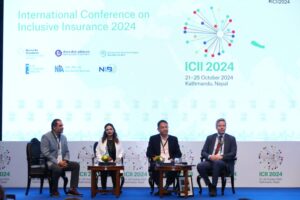
Lorenzo Chan highlighted the importance of collaboration in bridging the insurance protection gap and driving change. He stressed that while taking action may come at a cost, the cost of inaction is far greater. Lorenzo urged participants to build on the momentum from the event and work together for significant results.
This message was echoed by Pujan Dhungel who encouraged attendees to apply the knowledge gained and continue collaborating to foster positive change in the insurance sector. Pujan also emphasised the privilege of engaging with professionals from around the world, underscoring the importance of inclusive insurance in building a more resilient society.
Finally, Patricio Salas Guzmán expressed gratitude for the opportunity to participate in ICII 2024 and highlighted the event’s significance as a global forum for discussing inclusive insurance. He also emphasised Ecuador’s readiness to host the 2025 conference, underscoring the need to address the protection gap and enhance financial inclusion in the region.
Summary:
The conference concluded with remarks from key organizers and stakeholders, who reflected on ICII 2024’s accomplishments and outlined the agenda for ICII 2025. Pujan Dhungel Adhikari emphasized Nepal’s role in inclusive insurance and the need for continued collaboration. Lorenzo Chan highlighted Pioneer’s initiatives in inclusive insurance, sharing insights on product design and the power of partnerships. Dirk Reinhard expressed appreciation for the progress in inclusive insurance over the last two decades and underscored Munich Re Foundation’s ongoing commitment to this cause. He also pointed out the significant potential of a strategic, nation-wide approach to increase insurance outreach, as seen in Zambia. Patricio Salas discussed the importance of knowledge-sharing between countries to build a resilient and inclusive global insurance landscape.
Outlook for 2025:
ICII 2025 will continue to focus on innovative solutions, expanding financial resilience, and deepening collaboration across countries and sectors to advance inclusive insurance and adapt to emerging challenges.
Day 5 (October 25, 2024) – ICII 2024 Field Trip
The final day of the International Conference on Inclusive Insurance (ICII) 2024 included an organized field trip to Kageshwori Manahara Metropolitan Council in Gagalphedi, Nepal. This visit allowed participants to gain a firsthand understanding of Nepal’s agricultural and household insurance landscape and observe the direct impact of inclusive insurance policies on local communities. The field trip provided valuable insights into the successes, challenges, and future plans of the insurance system in rural Nepal.
These insights remind us that inclusive insurance is not merely a financial tool but a pathway to resilience and economic stability for vulnerable communities. Let’s continue to advocate for inclusive practices, empowering individuals and communities everywhere!
Report Prepared by The Insurance Times Research Team


